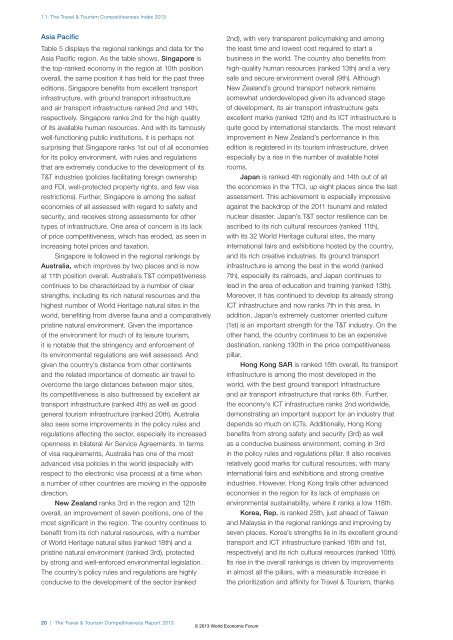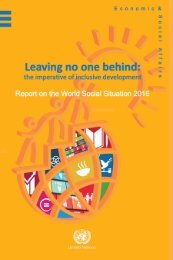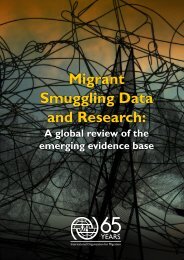The Travel & Tourism Competitiveness Report 2013
The Travel & Tourism Competitiveness Report 2013
The Travel & Tourism Competitiveness Report 2013
Create successful ePaper yourself
Turn your PDF publications into a flip-book with our unique Google optimized e-Paper software.
1.1: <strong>The</strong> <strong>Travel</strong> & <strong>Tourism</strong> <strong>Competitiveness</strong> Index <strong>2013</strong><br />
Asia Pacific<br />
Table 5 displays the regional rankings and data for the<br />
Asia Pacific region. As the table shows, Singapore is<br />
the top-ranked economy in the region at 10th position<br />
overall, the same position it has held for the past three<br />
editions. Singapore benefits from excellent transport<br />
infrastructure, with ground transport infrastructure<br />
and air transport infrastructure ranked 2nd and 14th,<br />
respectively. Singapore ranks 2nd for the high quality<br />
of its available human resources. And with its famously<br />
well-functioning public institutions, it is perhaps not<br />
surprising that Singapore ranks 1st out of all economies<br />
for its policy environment, with rules and regulations<br />
that are extremely conducive to the development of its<br />
T&T industries (policies facilitating foreign ownership<br />
and FDI, well-protected property rights, and few visa<br />
restrictions). Further, Singapore is among the safest<br />
economies of all assessed with regard to safety and<br />
security, and receives strong assessments for other<br />
types of infrastructure. One area of concern is its lack<br />
of price competitiveness, which has eroded, as seen in<br />
increasing hotel prices and taxation.<br />
Singapore is followed in the regional rankings by<br />
Australia, which improves by two places and is now<br />
at 11th position overall. Australia’s T&T competitiveness<br />
continues to be characterized by a number of clear<br />
strengths, including its rich natural resources and the<br />
highest number of World Heritage natural sites in the<br />
world, benefiting from diverse fauna and a comparatively<br />
pristine natural environment. Given the importance<br />
of the environment for much of its leisure tourism,<br />
it is notable that the stringency and enforcement of<br />
its environmental regulations are well assessed. And<br />
given the country’s distance from other continents<br />
and the related importance of domestic air travel to<br />
overcome the large distances between major sites,<br />
its competitiveness is also buttressed by excellent air<br />
transport infrastructure (ranked 4th) as well as good<br />
general tourism infrastructure (ranked 20th). Australia<br />
also sees some improvements in the policy rules and<br />
regulations affecting the sector, especially its increased<br />
openness in bilateral Air Service Agreements. In terms<br />
of visa requirements, Australia has one of the most<br />
advanced visa policies in the world (especially with<br />
respect to the electronic visa process) at a time when<br />
a number of other countries are moving in the opposite<br />
direction.<br />
New Zealand ranks 3rd in the region and 12th<br />
overall, an improvement of seven positions, one of the<br />
most significant in the region. <strong>The</strong> country continues to<br />
benefit from its rich natural resources, with a number<br />
of World Heritage natural sites (ranked 18th) and a<br />
pristine natural environment (ranked 3rd), protected<br />
by strong and well-enforced environmental legislation.<br />
<strong>The</strong> country’s policy rules and regulations are highly<br />
conducive to the development of the sector (ranked<br />
20 | <strong>The</strong> <strong>Travel</strong> & <strong>Tourism</strong> <strong>Competitiveness</strong> <strong>Report</strong> <strong>2013</strong><br />
2nd), with very transparent policymaking and among<br />
the least time and lowest cost required to start a<br />
business in the world. <strong>The</strong> country also benefits from<br />
high-quality human resources (ranked 13th) and a very<br />
safe and secure environment overall (9th). Although<br />
New Zealand’s ground transport network remains<br />
somewhat underdeveloped given its advanced stage<br />
of development, its air transport infrastructure gets<br />
excellent marks (ranked 12th) and its ICT infrastructure is<br />
quite good by international standards. <strong>The</strong> most relevant<br />
improvement in New Zealand’s performance in this<br />
edition is registered in its tourism infrastructure, driven<br />
especially by a rise in the number of available hotel<br />
rooms.<br />
Japan is ranked 4th regionally and 14th out of all<br />
the economies in the TTCI, up eight places since the last<br />
assessment. This achievement is especially impressive<br />
against the backdrop of the 2011 tsunami and related<br />
nuclear disaster. Japan’s T&T sector resilience can be<br />
ascribed to its rich cultural resources (ranked 11th),<br />
with its 32 World Heritage cultural sites, the many<br />
international fairs and exhibitions hosted by the country,<br />
and its rich creative industries. Its ground transport<br />
infrastructure is among the best in the world (ranked<br />
7th), especially its railroads, and Japan continues to<br />
lead in the area of education and training (ranked 13th).<br />
Moreover, it has continued to develop its already strong<br />
ICT infrastructure and now ranks 7th in this area. In<br />
addition, Japan’s extremely customer oriented culture<br />
(1st) is an important strength for the T&T industry. On the<br />
other hand, the country continues to be an expensive<br />
destination, ranking 130th in the price competitiveness<br />
pillar.<br />
Hong Kong SAR is ranked 15th overall. Its transport<br />
infrastructure is among the most developed in the<br />
world, with the best ground transport infrastructure<br />
and air transport infrastructure that ranks 6th. Further,<br />
the economy’s ICT infrastructure ranks 2nd worldwide,<br />
demonstrating an important support for an industry that<br />
depends so much on ICTs. Additionally, Hong Kong<br />
benefits from strong safety and security (3rd) as well<br />
as a conducive business environment, coming in 3rd<br />
in the policy rules and regulations pillar. It also receives<br />
relatively good marks for cultural resources, with many<br />
international fairs and exhibitions and strong creative<br />
industries. However, Hong Kong trails other advanced<br />
economies in the region for its lack of emphasis on<br />
environmental sustainability, where it ranks a low 118th.<br />
Korea, Rep. is ranked 25th, just ahead of Taiwan<br />
and Malaysia in the regional rankings and improving by<br />
seven places. Korea’s strengths lie in its excellent ground<br />
transport and ICT infrastructure (ranked 16th and 1st,<br />
respectively) and its rich cultural resources (ranked 10th).<br />
Its rise in the overall rankings is driven by improvements<br />
in almost all the pillars, with a measurable increase in<br />
the prioritization and affinity for <strong>Travel</strong> & <strong>Tourism</strong>, thanks<br />
© <strong>2013</strong> World Economic Forum

















